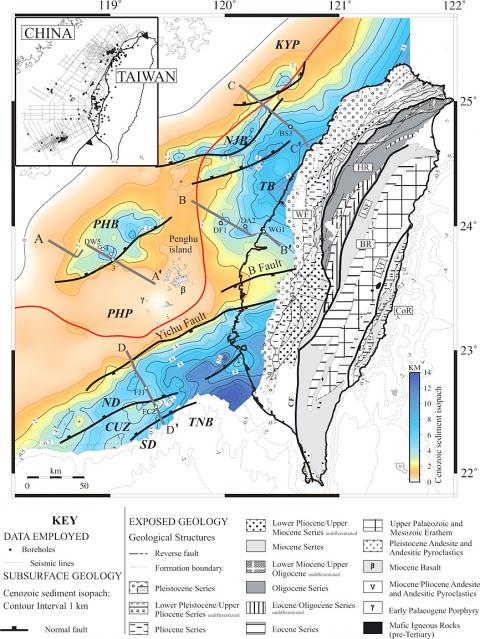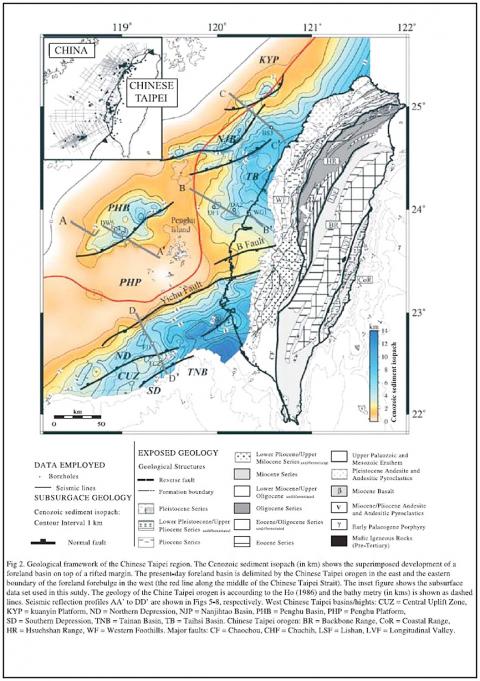National Central University associate professor of Earth sciences Lin Tien-shun (林殿順) on Friday sent a letter of complaint to the Australia-based Global Carbon Capture Storage Institute, after it changed references to Taiwan to “Chinese Taipei” in a 2003 paper of his.
The paper, titled “Cenozoic stratigraphy and subsidence history of the South China Sea Margin in the Taiwan region,” was published in the journal Basin Research in 2003 and was cited 358 times as of yesterday. Lin is the paper’s lead author, in collaboration with two academics from the University of Oxford.
The English-language paper he submitted uses Taiwan as the nation’s name, but those references were changed to “Chinese Taipei,” while “Taiwan Strait” was changed to “Chinese Taipei Strait” on the institute’s Web site, Lin wrote on Facebook on Friday.

Photo: Screen grab from Lin Tien-shun’s Facebook page
He has written to the institute’s chairman of the board, Claude Mandil, to express his strong protest against its political interference in academic research, Lin said.
“These changes are ridiculous, unfair and unacceptable to Taiwanese. I request that you replace ‘Chinese Taipei’ with ‘Taiwan,’ as I originally wrote,” Lin wrote in the letter.
“I have been leading the Taiwan carbon storage project for years and visited your institute in Australia a few years ago. One of your former directors also visited Taiwan to exchange ideas on carbon storage,” Lin wrote.

Photo: Screen grab from Lin Tien-shun’s Facebook page
“If the incorrect and inappropriate references are not removed, we will consider stopping exchanges with your institution,” he wrote.
As of press time last night, Lin had not responded to questions from the Taipei Times about whether the institute had replied, but the institute’s link to the paper was invalid yesterday.
The nation should be referred to as “Taiwan,” “Taiwan, ROC” or “the Republic of China” in research funded by the Ministry of Science and Technology, ministry guidelines say.
Academics must request a change of name and inform the ministry’s corresponding agency if they find international journals or conference organizers using incorrect names in reference to the nation in papers, or the papers in question would not be counted as part of their five-year research work when applying for funding, the guidelines say.
The guidelines do not apply to Lin’s case, because the nation’s was correctly named in the original paper, the ministry said.
It called on researchers to file an immediate request for such names to be changed if they encounter similar situations.

ANOTHER EMERGES: The CWA yesterday said this year’s fourth storm of the typhoon season had formed in the South China Sea, but was not expected to affect Taiwan Tropical Storm Gaemi has intensified slightly as it heads toward Taiwan, where it is expected to affect the country in the coming days, the Central Weather Administration (CWA) said yesterday. As of 8am yesterday, the 120km-radius storm was 800km southeast of Oluanpi (鵝鑾鼻), Taiwan’s southernmost tip, moving at 9kph northwest, the agency said. A sea warning for Gaemi could be issued tonight at the earliest, it said, adding that the storm is projected to be closest to Taiwan on Wednesday or Thursday. Gaemi’s potential effect on Taiwan remains unclear, as that would depend on its direction, radius and intensity, forecasters said. Former Weather Forecast

As COVID-19 cases in Japan have been increasing for 10 consecutive weeks, people should get vaccinated before visiting the nation, the Centers for Disease Control (CDC) said. The centers reported 773 hospitalizations and 124 deaths related to COVID-19 in Taiwan last week. CDC Epidemic Intelligence Center Director Guo Hung-wei (郭宏偉) on Tuesday said the number of weekly COVID-19 cases reported in Japan has been increasing since mid-May and surpassed 55,000 cases from July 8 to July 14. The average number of COVID-19 patients at Japan’s healthcare facilities that week was also 1.39 times that of the week before and KP.3 is the dominant

The Chinese Communist Party’s (CCP) working group for Taiwan-related policies is likely to be upgraded to a committee-level body, a report commissioned by the Mainland Affairs Council (MAC) said. As Chinese President Xi Jinping (習近平) is increasingly likely to upgrade the CCP’s Central Leading Group for Taiwan Affairs, Taiwanese authorities should prepare by researching Xi and the CCP, the report said. At the third plenary session of the 20th Central Committee of the CCP, which ended on Thursday last week, the party set a target of 2029 for the completion of some tasks, meaning that Xi is likely preparing to

US-CHINA TRADE DISPUTE: Despite Beijing’s offer of preferential treatment, the lure of China has dimmed as Taiwanese and international investors move out Japan and the US have become the favored destinations for Taiwanese graduates as China’s attraction has waned over the years, the Ministry of Labor said. According to the ministry’s latest income and employment advisory published this month, 3,215 Taiwanese university graduates from the class of 2020 went to Japan, surpassing for the first time the 2,881 graduates who went to China. A total of 2,300 graduates from the class of 2021 went to the US, compared with the 2,262 who went to China, the document showed. The trend continued for the class of 2023, of whom 1,460 went to Japan, 1,334 went to